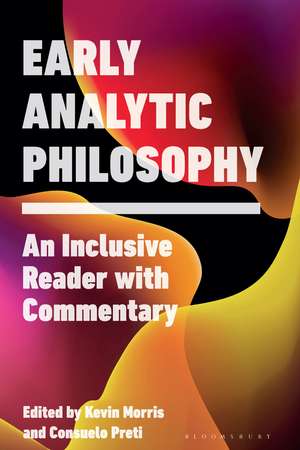Early Analytic Philosophy: An Inclusive Reader with Commentary
Editat de Kevin Morris, Consuelo Pretien Limba Engleză Paperback – 18 oct 2023
| Toate formatele și edițiile | Preț | Express |
|---|---|---|
| Paperback (1) | 239.59 lei 3-5 săpt. | +73.34 lei 4-10 zile |
| Bloomsbury Publishing – 18 oct 2023 | 239.59 lei 3-5 săpt. | +73.34 lei 4-10 zile |
| Hardback (1) | 544.30 lei 6-8 săpt. | |
| Bloomsbury Publishing – 18 oct 2023 | 544.30 lei 6-8 săpt. |
Preț: 239.59 lei
Preț vechi: 290.23 lei
-17% Nou
Puncte Express: 359
Preț estimativ în valută:
45.85€ • 47.60$ • 38.23£
45.85€ • 47.60$ • 38.23£
Carte disponibilă
Livrare economică 04-18 martie
Livrare express 15-21 februarie pentru 83.33 lei
Preluare comenzi: 021 569.72.76
Specificații
ISBN-13: 9781350323599
ISBN-10: 1350323594
Pagini: 608
Dimensiuni: 156 x 234 x 25 mm
Greutate: 0.45 kg
Editura: Bloomsbury Publishing
Colecția Bloomsbury Academic
Locul publicării:London, United Kingdom
ISBN-10: 1350323594
Pagini: 608
Dimensiuni: 156 x 234 x 25 mm
Greutate: 0.45 kg
Editura: Bloomsbury Publishing
Colecția Bloomsbury Academic
Locul publicării:London, United Kingdom
Caracteristici
Combines introductory material and commentaries with primary sources to support complex texts
Notă biografică
Kevin Morris is Associate Professor of Philosophy at Tulane University, USA.Consuelo Preti is Professor of Philosophy at The College of New Jersey, USA.
Cuprins
Preface How to Use Early Analytic PhilosophyComments on the TextAcknowledgements Chapter 1. Introducing Analytic Philosophy Chapter 2. F.H. Bradley and Monistic Idealism Background and CommentaryBackgroundMonistic IdealismCritique of RelationsAppearance and RealityConcluding RemarksFurther ReadingReadings Appearance and Reality (Selections from Ch. 1-3, 12-14) Chapter 3. G.E. Moore on Idealism, the Good, and Common SenseBackground and Commentary BackgroundCritique of Monistic IdealismGoodness and the Naturalistic FallacyCommon Sense and PhilosophyConcluding RemarksFurther ReadingReadings "The Refutation of Idealism"Principia Ethica, Chapter 1"A Defence of Common Sense""Proof an External World" Chapter 4. Gottlob Frege: Logic and the Philosophy of LanguageBackground and CommentaryBackgroundLogic and LogicismSense, Reference, and ThoughtsConcluding RemarksFurther ReadingReadings "On Sense and Reference" "The Thought"Chapter 5. Bertrand Russell on Relations, Descriptions, and KnowledgeBackground and CommentaryBackgroundMonism and RelationsNames and DescriptionsAnalysis, Sense Data, and Scientific PhilosophyConcluding RemarksFurther ReadingReadings Russell on Monism and Relations (Selections from The Principles of Mathematics and Our Knowledge of the External World)"On Denoting""Knowledge by Acquaintance and Knowledge by Description""Logical Atomism" Chapter 6. E.E. Constance Jones on Language and LogicBackground and CommentaryBackgroundDevelopments in LogicJones and Russell: the 1910-1911 DebateConcluding RemarksFurther ReadingReadings"Mr. Russell's Objections to Frege's Analysis of Propositions""A New Law of Thought" Chapter 7. Ludwig Wittgenstein on Language and Philosophy Background and CommentaryBackgroundLanguage, Reality, and Philosophy in the TractatusAfter the TractatusConcluding RemarksFurther ReadingReadings Tractatus Logico-Philosophicus (Selections) Chapter 8. Logical Empiricism: Meaning, Metaphysics, and Mathematics Background and CommentaryBackgroundMeaning, Verification, and MetaphysicsEthical DiscoursePhilosophy of Mathematics and LogicConcluding RemarksFurther ReadingReadingsHahn, Neurath, and Carnap, "The Scientific Conception of the World: The Vienna Circle"Schlick, "Meaning and Verification"Carnap, "The Elimination of Metaphysics."Ayer, Language, Truth, and Logic (Selections from Ch. 4, 6) Chapter 9. Susan Stebbing on Logic, Language, and AnalysisBackground and CommentaryBackgroundLogic and LanguageLanguage and ScienceEmpiricism and Analysis Concluding RemarksFurther ReadingReadingsA Modern Introduction to Logic (Selections from Ch. 1, 24)Philosophy and the Physicists (Selections from Ch. 3)"Logical Positivism and Analysis" Chapter 10. W.V.O Quine on Analyticity and OntologyBackground and CommentaryBackgroundAnalyticity RejectedOntological CommitmentConcluding RemarksFurther ReadingReadings "On What There Is""Two Dogmas of Empiricism" Chapter 11. Analytic Philosophy Since 1950 References Index
Recenzii
Early analytic philosophy contains much food for thought, but it has often been ignored by contemporary philosophers. This volume is a fantastic starting point for understanding aspects of early analytic ideas - it is the kind of book I will use myself, and will recommend it to my colleagues and students.
Analytic philosophy is a wide-ranging field, encompassing different methods, viewpoints, and intellectual trajectories. Selecting its major historical sources for the interested students is a challenging task, but Morris and Preti have produced an engaging collection with their masterfully written, clear, and intelligible commentaries. The present textbook includes all the major heroes and some of the previously neglected and forgotten figures from the early history of analytic philosophy, thus students, teachers, and even early career researchers shall use the book without hesitation within and outside the classroom. This will be a textbook used for many years without real competition.
This is a well-chosen and clearly-explained collection of some of the most important work in early analytic philosophy, from its origin in British Idealism to the mid-century work of W.V. Quine. The authors do an excellent job of helping students to understand these often-obscure texts.
The book of Kevin Morris and Consuelo Preti is a well-informed introduction to the early analytic philosophy that can be of interest not only for undergraduate students but also for seasoned scholars. It combines in fine balance informative introductory elucidations of leading early analytic philosophers with excerpts of their works.
Analytic philosophy is a wide-ranging field, encompassing different methods, viewpoints, and intellectual trajectories. Selecting its major historical sources for the interested students is a challenging task, but Morris and Preti have produced an engaging collection with their masterfully written, clear, and intelligible commentaries. The present textbook includes all the major heroes and some of the previously neglected and forgotten figures from the early history of analytic philosophy, thus students, teachers, and even early career researchers shall use the book without hesitation within and outside the classroom. This will be a textbook used for many years without real competition.
This is a well-chosen and clearly-explained collection of some of the most important work in early analytic philosophy, from its origin in British Idealism to the mid-century work of W.V. Quine. The authors do an excellent job of helping students to understand these often-obscure texts.
The book of Kevin Morris and Consuelo Preti is a well-informed introduction to the early analytic philosophy that can be of interest not only for undergraduate students but also for seasoned scholars. It combines in fine balance informative introductory elucidations of leading early analytic philosophers with excerpts of their works.
